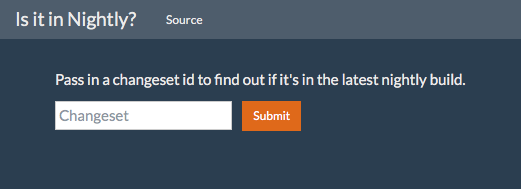Is it in Nightly yet?
Are you a Mozilla developer? Has your manager, itching to try out your latest feature, ever asked you, “Is it in the latest Nightly build yet?” I asked myself a little too often so I built a thing:

It’s quite simple - pass in a changeset id and get an answer! Try it out at http://mcomella.com/is-it-in-nightly!
Lessons learned
React
I’ve been thinking about ways to construct more robust applications in less time. To this end, React is mentioned a lot and this seemed like a great opportunity to finally get my toes wet. Here are some things I liked:
-
Proper modularized components1 reduces the burden of context-switching between UI elements, making it simpler to think about, focus on, and maintain each component.
-
Via the
this.setStatecalls, React explicitly forced me to declare and reason about state changes in my app. Rather than thinking about the state of the few variables I was actively using, I naturally thought through the state of all of the variables in my component.I benefited from this when I was adding error handling that returned from a callback early. With my traditional development patterns, I would have initially forgotten to update the component state but with React, I was naturally conscious of my state changes and added the code as second-nature. Notably, I also got the error handling state change correct the first time, which I probably wouldn’t have done in traditional development, where I might forget to update a variable.
To be fair, I’ll need to build a more complex app to really experience & understand what the benefits of React are – and more importantly, its trade-offs!
Testing
While I implemented this project, I was faced with a dilemma: write tests because I’m creating a program I’d expect others to use2 or don’t because it’s just a small project. In the end, I decided to write a few tests.
I came to discover that, even on tiny projects, testing is invaluable.
The server response in the initial implementation was slow when a changeset
was not in Nightly because the server didn’t return quickly for invalid
changeset IDs. I decided to add a fast fail implementation to
mozhg.isRevisionSetValid, for which I already wrote some tests that
passed the first time – you know, the kind that you have to intentionally
break to make sure they’re actually working – and, given how simple the
code I added was3, I was surprised to find these tests failing,
despite the application seeming to perform correctly with manual testing.
Testing is great: I intend to do more.
Code re-use
I originally built this with a server component4 and later found out I could do this all in a standalone HTML page. Given how much easier it is to host HTML content, I decided to make the conversion.
My server implementation was in node.js and, using
browserify, I found it incredibly easy to move my code from the
server to the browser. Given that my my code was already divided into the
mozhg node module and my client-side React code, I simply had to rewrite the
entry point of the page to delegate calls from React directly into my node
module, rather than passing these requests to the server. If I had written the
server in Python, it would have been a lengthy conversion!
Writing server-side and client-side code in the same language can be extremely valuable if it’s unclear where the separation of concerns will lie. That being said, I could have done more research about what was possible, but there are trade-offs: we don’t always have time to do all the research.
Implementation
To find the latest Nightly changeset ID, I dive into Mozilla’s latest
Nightly file dump5. Once there, I take the moz_source_stamp
attribute from the fennec*.json file. moz_source_stamp represents
the topmost commit that made it into that night’s build.
With changeset ID in hand, I access Mozilla’s hgweb service. There are JSON APIs available for most of the commands you’d find in a local hg repository and, fortunately for me, anything involving revision sets isn’t one of them. As such, I scrape the html interface for a mozilla-central changelog revision set query. This query goes from the changeset specified by the user to the latest Nightly changeset. If the query returns an empty list, the user-specified changeset is either 1) not in mozilla-central or 2) appears after the last Nightly changeset and thus is not in Nightly. If it returns a list of changesets, the changeset is in mozilla-central before the last Nightly changeset and thus is in Nightly.
As I elaborated on in the testing section above, in order to return quickly from this method, I validate the changesets before passing them to the revision set function.
Curious for more? You can find the source on Github.
1: e.g. compared to web development without UI frameworks, but this is also a general statement about how important encapsulation is.
2: It helps that my application depends on external factors like website scraping too.
3: It turns out I did not intend to return r1 && r2, a coercion of my
string input arguments. Instead, I wanted isR1Valid && isR2Valid, which
are two booleans. Oh, Javascript…
4: I make XSS requests (to get the revision content) and got blocked by
CORS. I created a server component to make the requests on the client’s
behalf before I realized the requests were only blocked when accessing
the Mozilla properties via http, as opposed to https.
5: The file dump is specific to Firefox for Android, which may or may not share the same latest commit for its nightly builds with other projects (e.g. desktop Firefox). If you’re interested in using this for other projects, file an issue!
Is it in Nightly yet?
© 2025
by Michael Comella
is licensed under Creative Commons Attribution-ShareAlike 4.0 International